Using Prehabilitation to Prevent Volleyball Injuries
Your first paragraph of content.
How to prevent volleyball injuries?
No one plans on having an injury. But sometimes, they just happen, even to the most careful athlete. So what can a volleyball player do to prevent injuries before they happen? The answer is a simple method called prehabilitation.
Prevent Volleyball Injuries - Prehabilitation
Prehabilitation is a combination of strength and flexibility training designed to prepare the body to resist a stressful force applied to it. 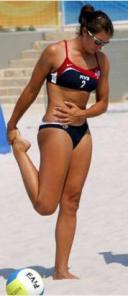
Off-season and early pre-season are the best times to engage in prehabilitation and injury prevention exercises. Athletic events are the perfect example of the kind of ambulation it is designed to resist. When the body is responding to a variety of factors and the muscles are being pushed to peak levels of endurance and strength, the risk of injury is magnified. Prehabilitation helps reduce this effect by focusing on problem areas such as shoulders, hamstrings and groins.
If you are already focusing on strength training in your workouts then chances are you have performed a number of basic key motions critical to injury prevention such as squats, dead lifts, lunges and shoulder presses. The muscles built in these exercises will support your joints and defend against an injury.
Few Exercises to Prevent Volleyball Injuries
Here are a few examples of more targeted exercises to add to your workout routine:Lateral Raise:
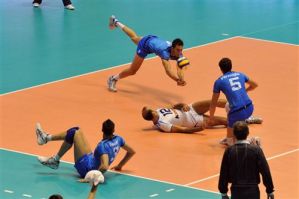
Grab a pair of dumbbells and stand, allowing them to fall to your sides. Lift the dumbbells upwards and off to each side with arms straight until they are at shoulder level. Then return them slowly back to your sides.
Front Raise:
Grab a pair of dumbbells and stand allowing them to fall to your thighs. Lift the dumbbells upwards in front of you with your arms straight until they are at shoulder level. Then return them slowly back to your thighs.
180 Jump Squats:
Squat down until your thighs are parallel with the floor, then push back up and jump with a 180 degree rotation in mid air.
Hot Foot:
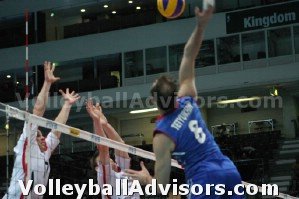
Stand on one foot and jump forwards, backwards, to the left and right, then repeat. Make sure you are only jumping a few inches or a foot of distance for each step.
Isolated shoulder exercises:
Isolated shoulder exercises help correct and prevent motor control errors and imbalances in the shoulder joints, while building strength and hypertrophy that defend against injury.
Click the link below to see specific isolated shoulder exercises for volleyball players.
Volleyball Injuries - Isolated Shoulder Exercises
Lower Body Exercises:
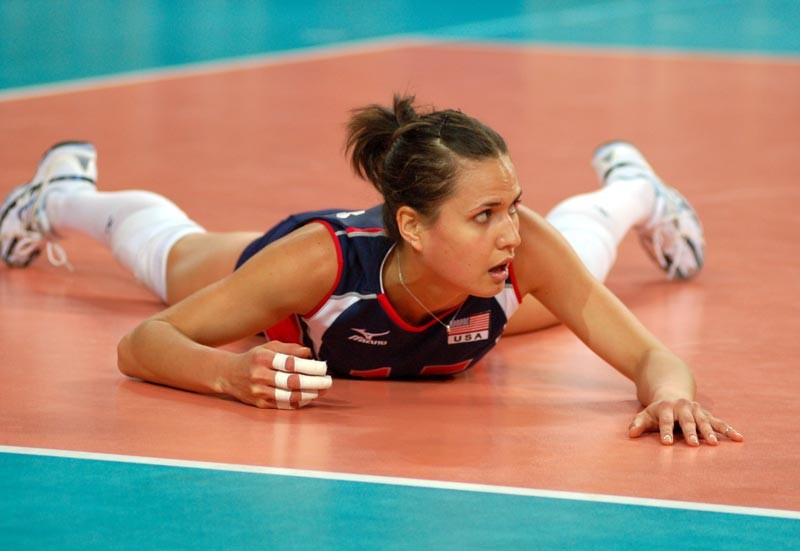
For lower body exercises, the best training to perform for prehabilitation usually involves plyometric exercises, such as the ones listed. These exercises typically involve jumping and lateral shifting of weight to create explosive power and balance, an excellent defense against injury during a game.
Rotational Exercises:
Rotational exercises can also be a powerful ally in creating a more injury resilient body. A rotation exercise increases strength while emphasizing a larger, more complex range of motion to increase flexibility.
Examples of rotational exercises include:
Arnold Press:
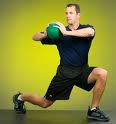
Made famous by one of the best body builder of the 70's, the Arnold Press is simply a dumbbell shoulder press with a twist. To perform this, start with the dumbbells over your head and arms straight with palms facing away, then twist as you lower the weights so your palms are facing towards you.
Rotational Lunge:
Grab a pair of dumbbells and take a step forward. Bend both your knees until your rear knee is a couple inches from the ground with your rear toe against the ground. Finally, rotate your torso until the dumbbell adjacent to your rear leg touches or almost touches your front knee. The lunge movement sounds complicated, but once you break it down into a lunge with a twist, it's a lot simpler than it sounds! These movements not only help enhance flexibility and dexterity but also can also significantly improve core strength.
Prevent Volleyball Injuries - Conclusion
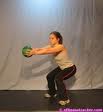
Besides isolated shoulder exercises, other good injury prevention exercises would be ham-groin area exercises, which are often used in rehabilitation, when recovering from the injury.
Like this page:




